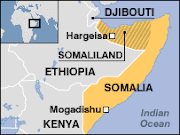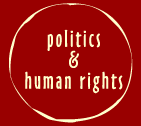 The International Crisis Group published this article about the Plight of Somalia in French.
The International Crisis Group published this article about the Plight of Somalia in French.Please click here to read the original French language article.
Below is web based translation of the article in English.
Conflict destroys the Somalia for nineteen years gives all signs of entering a new stage more desperate for the population, more complicated on the political and more dangerous plan for the world.
Meteoric growth in the number of pirate attacks off the coast of this martyr country resulted in a mobilisation of maritime resources important to try to curb the phenomenon.
Yet, this is on land that is is played on more than two decades the destruction of a country with some survivors have found in piracy an unhoped-for way out of poverty.
While the national reconciliation process raised a certain hope at the beginning of 2009, the escalation of violence in the capital and in the South of the country might destroy modest advanced over the last few months. Without vigorous and concerted outside actors intervention, the brutal disintegration of the country speed:
the fighting continue cause floods of displaced persons and provide a conducive to radical Islamist groups recruiters compost.
Advertising
Today, the Transitional Government is lower than ever. It controls only a few districts of Mogadishu. Elsewhere, the army and Islamic factions clash to sit their power. Since the dissolution of their alliance, fighting resumed between two radical groups Al-Shabaab and Hizb al-Islam. Al-Shabaab, ever more closely linked to international djihadisme dominates most of southern cities.
The humanitarian situation exceeds the imaginable. Close to half of the population, or 3.6 million people, is dependent on food aid. Nearly a half million refugees have fled to neighbouring countries and more than 1.3 million displaced internal legacy in camps around Mogadishu. The prolonged drought and threats against humanitarian personnel contributed to produce one of the greatest humanitarian disasters in the world.
Al-Qaida fighters some come from Pakistan saw fair: anarchy and misery, the political polarization attisée by ideological differences are an ideal field of action for them.
The abyssal situation is the result of a series of political failures and missed opportunities. At the beginning of the year, the conflict resolution process seemed finally draw.
The "process of Djibouti" was, under the aegis of the United Nations, allow the rallying to moderate insurrectionnels movements transitional Government and to isolate the radical groups.
Under pressure from the United Nations, African Union, the European Union and the United States, Sheik Sharif, a former insurgent rallié process of Djibouti, was appointed President of the Transitional Government. It seemed fair to expect to rally to its cause groups until then opposed to the reconciliation process.
But Sharif went to negotiations without will have the means to offer real benefits to the insurgents in exchange for their rallying. Consensus candidate, Sharif quickly rose to the status of traitor in the eyes of these groups. The Government is now lower than ever: acculé in Mogadishu, must its survival in support of international forces.
Yet the United States and Ethiopia blocked negotiations with major figures of the rebellion, they see as Islamist terrorists. In hesitating to engage politically with the insurgents, the United Nations have, too, failed to play their role as mediator.
Today, Sharif agreed with those who consider that armed intervention is the only alternative after the failure of the Djibouti process. Taken in the preparation of a massive offensive against the insurgents, it can no longer be Ombudsman figure.
Yet the insurgency is more divided than ever and its more radical faction, Al-Shabaab, is subject to growing political pressure. The brutal elimination of political dissidents and the uncompromising application of Sharia law have made it unpopular in the eyes of the population.
When challenge to restart on an acceptable basis for the majorité of the Somali peace process. Mediators must be nominated and it is imperative to resume language with the insurgents. Somalia has unfortunately defied since good more aguerries mediating will chandeliers...
The challenge of the moment is to create a negotiation process leads and appropriate by the Somalis. A process that can gather around its settings a broad consensus and where a large number of insurgents groups would find his account. A process that would see Eritrea and Ethiopia cease to inflame the conflict and the United States, blinded by their fear of terrorism, halt their deliveries of weapons.
The danger of having the endless Somali conflict eventually destabilize its neighbours is more real than ever. Piracy and its rocambolesques episodes occupy our screens at point blank hundreds of thousands of refugees in Kenya and internal displaced millions.
Avoid as the descendants of these damned of the earth do meet the sirens of extremism should motivate the countries of the region, the great powers and UN, REList with courage and perseverance the book on the business and again undertake the hard work of renew son tenuous dialogue, there where everything appears as lint and tatters.
Alain Délétroz is vice-president (Europe) of the international Crisis Group.
The time





